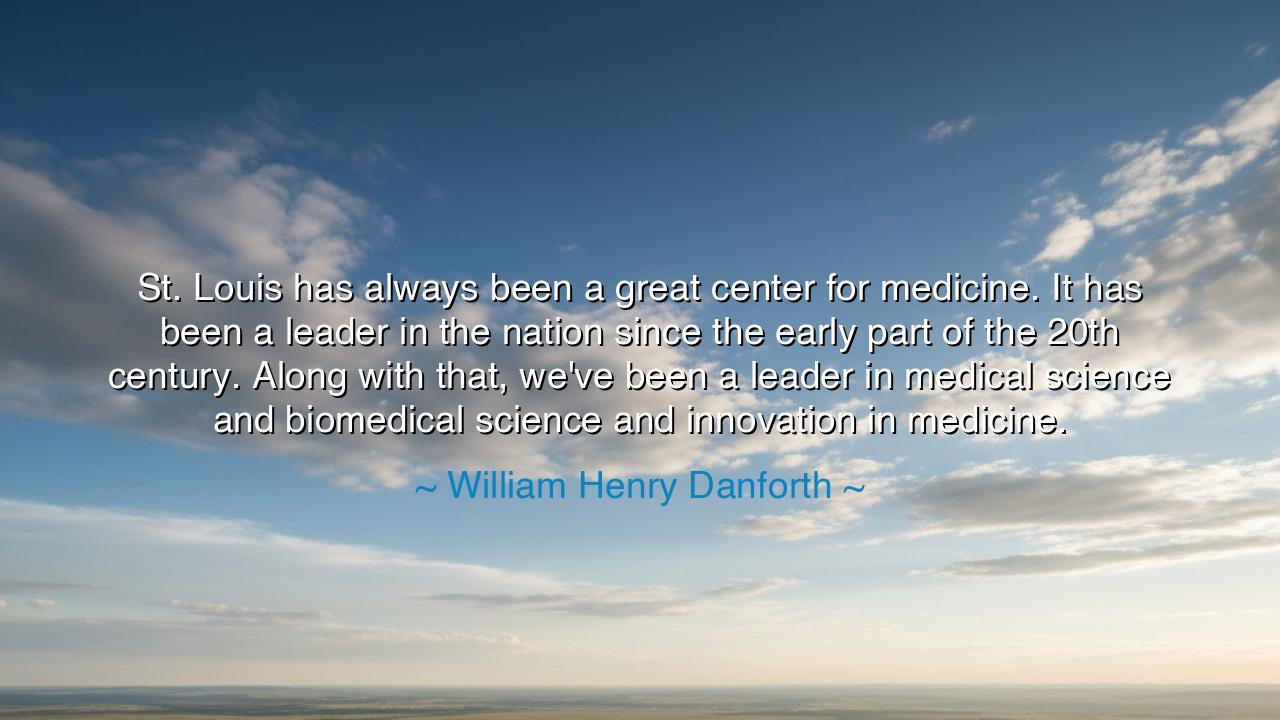
St. Louis has always been a great center for medicine. It has
St. Louis has always been a great center for medicine. It has been a leader in the nation since the early part of the 20th century. Along with that, we've been a leader in medical science and biomedical science and innovation in medicine.






“St. Louis has always been a great center for medicine. It has been a leader in the nation since the early part of the 20th century. Along with that, we’ve been a leader in medical science and biomedical science and innovation in medicine.” Thus spoke William Henry Danforth, physician, teacher, and visionary — a man whose words carried both pride and reverence for the sacred pursuit of healing. His statement was not mere boast, but remembrance: a tribute to a city whose heart beats to the rhythm of progress, compassion, and discovery. Beneath these words lies a deeper truth — that greatness in medicine is not born from chance, but from the courage to question, to learn, and to serve.
From the early days of the 20th century, St. Louis stood as a beacon for those who sought to understand life’s mysteries and conquer its frailties. It was here that the light of Washington University School of Medicine began to shine — not as a monument of stone and glass, but as a sanctuary for inquiry and innovation. The physicians and scholars of that city, guided by duty and faith in knowledge, turned their eyes toward the invisible — the cells, the diseases, the threads of life itself — and through their work, they lifted the standard of health across a nation. Danforth, as chancellor and physician, was among those who carried this torch, guarding it with both intellect and humility.
To call St. Louis a “leader in medical science” is to honor not only the institutions but the souls who gave their lives to the healing art. The men and women who studied within its laboratories and hospitals were like the philosophers of old — seekers of truth, unafraid of failure, devoted to service. They were the heirs of Hippocrates, who taught that medicine is a sacred trust; of Pasteur, who waged war against the unseen; and of Florence Nightingale, who taught that compassion is as necessary as knowledge. In the heart of America, St. Louis became a modern Athens of medicine, where reason and mercy joined hands.
Among its proud legacies stands the story of Carl and Gerty Cori, the husband-and-wife team who worked at Washington University and won the Nobel Prize in Physiology or Medicine in 1947 for uncovering how the body transforms sugar into energy. Their discovery illuminated the invisible fire that sustains human life — a revelation that changed the course of biochemistry forever. Such triumphs are not born from ambition alone, but from the enduring spirit of a place that reveres inquiry and honors service. Through them, St. Louis became not merely a city of medicine, but a symbol of what humanity can achieve when knowledge is wed to purpose.
William H. Danforth himself embodied that same spirit. He was not content to dwell in comfort or tradition; he looked always toward the horizon, where the next challenge awaited. Under his leadership, the Danforth Foundation and Washington University became engines of transformation, supporting scientific research, education, and the training of minds that would carry healing to every corner of the earth. He believed deeply that innovation in medicine is not an act of pride, but of duty — a sacred responsibility to improve the human condition. And through his life, he proved that true greatness in science is rooted in humility before the mysteries of creation.
The wisdom in Danforth’s words reaches beyond St. Louis, beyond medicine, beyond time. He reminds us that progress is not the work of a moment but of generations — that innovation requires not only intelligence, but faith in humanity. A city becomes great not by its wealth or monuments, but by its devotion to knowledge and service. Every discovery, every experiment, every healing touch becomes a stone in the temple of human progress. Science and compassion, joined together, form the twin pillars of civilization.
Let this truth be carried forward to all who listen: whether you dwell in St. Louis or in distant lands, be a builder of knowledge and a servant of life. Respect the past, but do not rest within it. Honor the healers, but become one in your own way — not only through medicine, but through any craft that eases suffering and uplifts the human spirit. As Danforth believed, the path of innovation is the path of stewardship. It is the path of those who dare to see not what is, but what can be.
So, my children, remember the lesson of St. Louis and the wisdom of William Henry Danforth: leadership in medicine — and in all human endeavor — is not given; it is earned through faith, courage, and relentless service. Let your life, too, become a center of healing. Let your actions echo across generations, as the work of St. Louis still does, and may the light of knowledge never dim in your hands.






AAdministratorAdministrator
Welcome, honored guests. Please leave a comment, we will respond soon